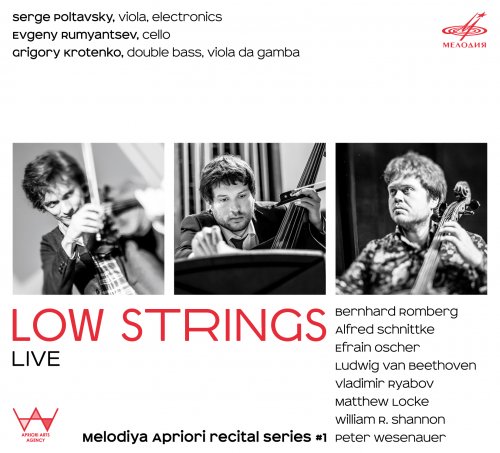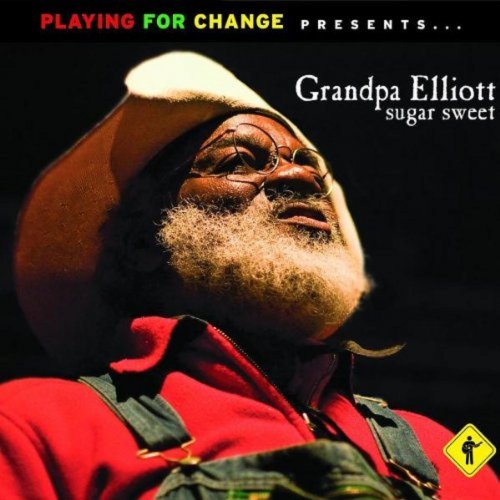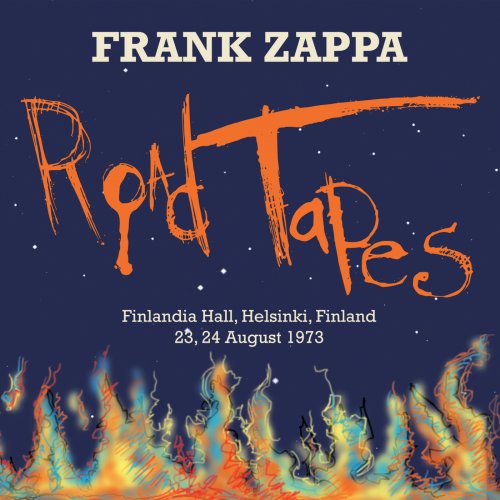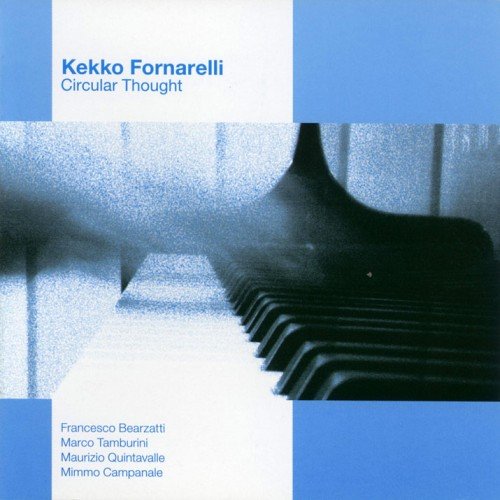Serge Poltavsky, Evgeny Rumyantsev & Grigory Krotenko - Low Strings (Live) (2016)

Artist: Serge Poltavsky, Evgeny Rumyantsev, Grigory Krotenko
Title: Low Strings (Live)
Year Of Release: 2016
Label: Melodiya
Genre: Classical
Quality: FLAC (image + .cue, log, artwork)
Total Time: 79:56
Total Size: 344 MB
WebSite: Album Preview
Tracklist:Title: Low Strings (Live)
Year Of Release: 2016
Label: Melodiya
Genre: Classical
Quality: FLAC (image + .cue, log, artwork)
Total Time: 79:56
Total Size: 344 MB
WebSite: Album Preview
Bernhard Romberg
[1]-[3] Trio in E minor from 3 trios d’une difficulté progressive
for viola and two cellos, Op. 38 No. 1 (1798)
Alfred Schnittke
[4] Hymn II for cello and double bass (1974)
Efrain Oscher
[5]-[12] Escenas del Sur for viola and double bass (2008)
Ludwig van Beethoven
[13] Duet mit zwei obligaten Augengläsern
for viola and cello in E flat major, WoO 32 (1796)
Vladimir Ryabov
[14] Motet to the Cologne Cathedral for viola, cello and double bass
from the European cathedrals cycle, Op. 77 (1998)
Matthew Locke
[15] Fantasia No. 3 for three violas da gamba
from Suite No. 1 in C minor Flatt Consort (ca. 1650)
William R. Shannon
[16] Tableau alla Bachiana for cello with tape (1993)
Peter WesenAuer
[17]-[20] Lasterhaftes
Trio for viola, cello and double bass, WWV 141 (2005)
Performers:
Serge Poltavsky, viola
Evgeny Rumyantsev, cello
Grigory Krotenko, double bass
Firma Melodiya presents Low Strings, the first release from the Melodiya Apriori series.
For the past twenty-five years, a Russian label hasn’t released a project as uncommon and tricky as this. It is absolutely beyond the conventional notion of “chamber music recording,” neither by instrumental lineup (a viola, a cello and a double bass – it’s hardly the most advantageous of combinations that coincides lay belief), nor by selection of the music genres and styles. Matthew Locke, a representative of early English Baroque, Beethoven with his comic “eyeglasses” duet, his contemporary Bernhard Romberg, and next to them Alfred Schnittke, Vladimir Ryabov and composers of West European avant-garde with electronics attached.
The artistic will of the performers is perhaps the principal consolidating point of the album. It first of all applies to violist, organizer and enlightener Serge Poltavsky who united the effort of cellist Evgeny Rumyantsev, double bass player Grigory Krotenko (his role in the recording of the album is one of the leading ones) and sound engineer of the Moscow Conservatory and creator of the single sonic space of the Low Strings Mikhail Spassky.
It is also gratifying to hear not a distilled studio work, but live concert sound recorded at the Small Hall of the Moscow Conservatory in 2016. So, Melodiya, as it did many years ago, documents the recent past again. The fact itself makes us confident that this recording will find its listener.
For the past twenty-five years, a Russian label hasn’t released a project as uncommon and tricky as this. It is absolutely beyond the conventional notion of “chamber music recording,” neither by instrumental lineup (a viola, a cello and a double bass – it’s hardly the most advantageous of combinations that coincides lay belief), nor by selection of the music genres and styles. Matthew Locke, a representative of early English Baroque, Beethoven with his comic “eyeglasses” duet, his contemporary Bernhard Romberg, and next to them Alfred Schnittke, Vladimir Ryabov and composers of West European avant-garde with electronics attached.
The artistic will of the performers is perhaps the principal consolidating point of the album. It first of all applies to violist, organizer and enlightener Serge Poltavsky who united the effort of cellist Evgeny Rumyantsev, double bass player Grigory Krotenko (his role in the recording of the album is one of the leading ones) and sound engineer of the Moscow Conservatory and creator of the single sonic space of the Low Strings Mikhail Spassky.
It is also gratifying to hear not a distilled studio work, but live concert sound recorded at the Small Hall of the Moscow Conservatory in 2016. So, Melodiya, as it did many years ago, documents the recent past again. The fact itself makes us confident that this recording will find its listener.



![The Baroque Jazz Ensemble - The Baroque Jazz Ensemble (feat. Ira Schulman) (2025) [Hi-Res] The Baroque Jazz Ensemble - The Baroque Jazz Ensemble (feat. Ira Schulman) (2025) [Hi-Res]](https://img.israbox.com/img/2025-12/19/yehoqbmzkuwk180c26lz85clx.jpg)

![Ready Player 3 - Ready Player 3 (2025) [Hi-Res] Ready Player 3 - Ready Player 3 (2025) [Hi-Res]](https://www.dibpic.com/uploads/posts/2025-12/1766128773_cover.jpg)


![Frank Sinatra, Count Basie - It Might As Well Be Swing (1964) [2021 SACD] Frank Sinatra, Count Basie - It Might As Well Be Swing (1964) [2021 SACD]](https://www.dibpic.com/uploads/posts/2025-12/1766090910_scan-1.jpeg)